Global Strategy, Development and Implementation Report: Unilever Case
VerifiedAdded on 2022/12/22
|9
|1882
|1
Report
AI Summary
This report examines the global strategy, development, and implementation of Unilever, a British multinational consumer goods company. It begins by outlining the reasons for Unilever's international expansion, including new market opportunities, diversification, competitive advantages, and foreign investment prospects. The report then analyzes the strategic choices available to the company, such as business strategy, marketing strategy, exporting, franchising, and customer relationship management. It also explores the reasons behind the choice of subsidiary locations, specifically highlighting the Ben & Jerry’s subsidiary in the United States and its strategic importance. The report references academic sources to support its claims, providing a comprehensive overview of Unilever's global strategy and its implications for business growth and market share. The analysis covers the company's operations, market positioning, and strategic decisions, offering insights into its approach to international business and its ability to adapt to changing market dynamics. The report ultimately emphasizes the importance of strategic planning and execution in achieving global success, particularly within the competitive landscape of the consumer goods industry.
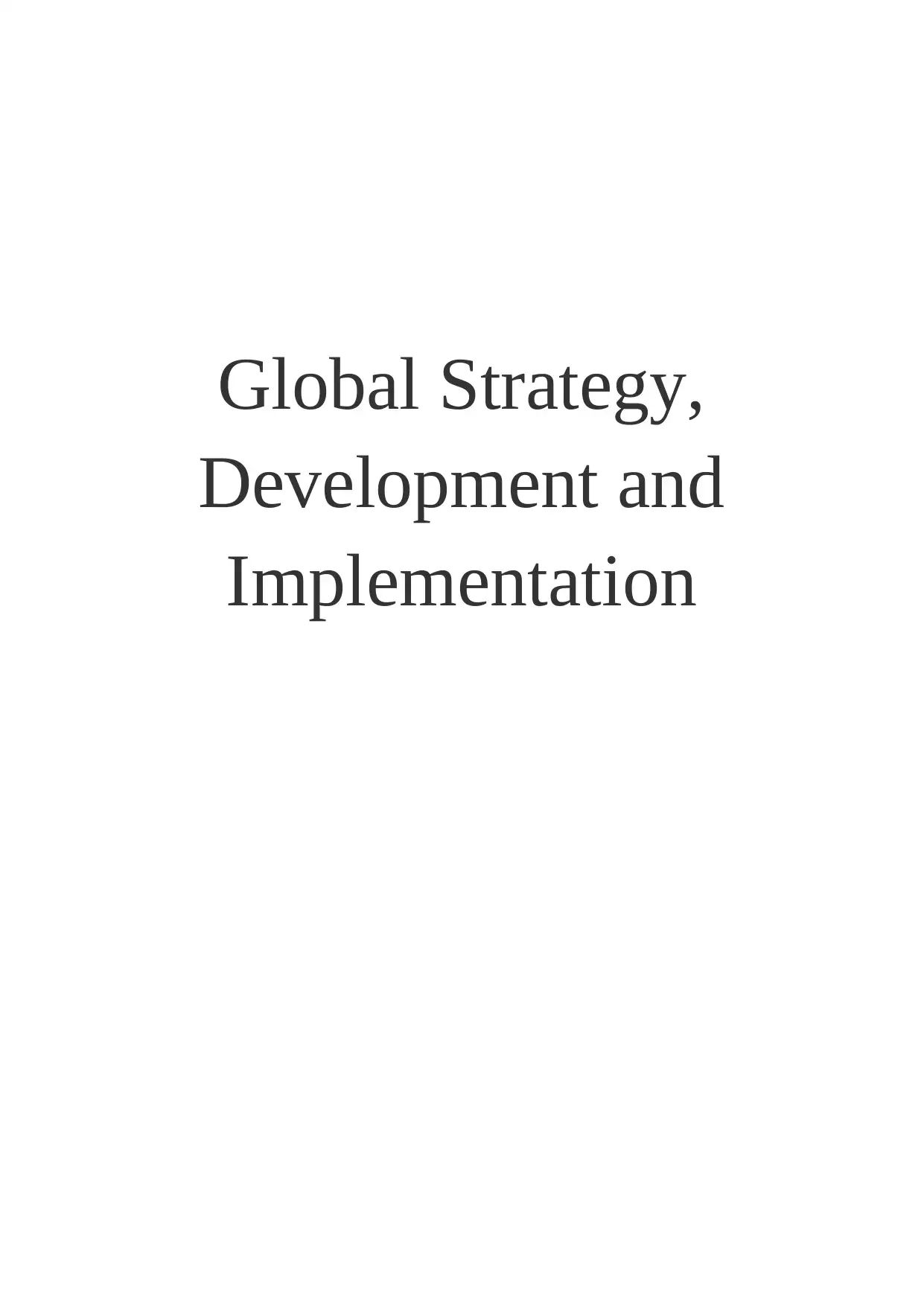
Global Strategy,
Development and
Implementation
Development and
Implementation
Paraphrase This Document
Need a fresh take? Get an instant paraphrase of this document with our AI Paraphraser

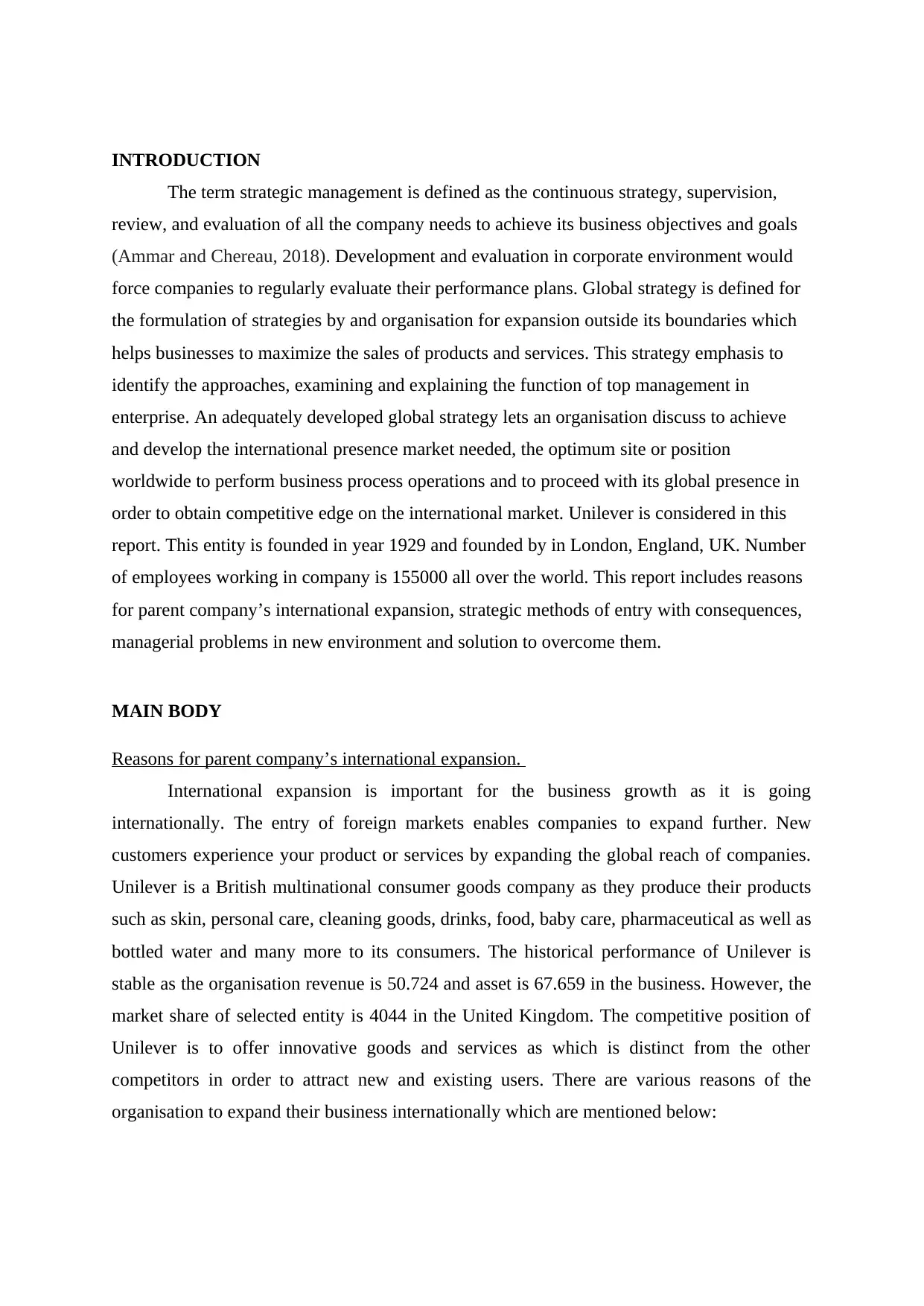
INTRODUCTION
The term strategic management is defined as the continuous strategy, supervision,
review, and evaluation of all the company needs to achieve its business objectives and goals
(Ammar and Chereau, 2018). Development and evaluation in corporate environment would
force companies to regularly evaluate their performance plans. Global strategy is defined for
the formulation of strategies by and organisation for expansion outside its boundaries which
helps businesses to maximize the sales of products and services. This strategy emphasis to
identify the approaches, examining and explaining the function of top management in
enterprise. An adequately developed global strategy lets an organisation discuss to achieve
and develop the international presence market needed, the optimum site or position
worldwide to perform business process operations and to proceed with its global presence in
order to obtain competitive edge on the international market. Unilever is considered in this
report. This entity is founded in year 1929 and founded by in London, England, UK. Number
of employees working in company is 155000 all over the world. This report includes reasons
for parent company’s international expansion, strategic methods of entry with consequences,
managerial problems in new environment and solution to overcome them.
MAIN BODY
Reasons for parent company’s international expansion.
International expansion is important for the business growth as it is going
internationally. The entry of foreign markets enables companies to expand further. New
customers experience your product or services by expanding the global reach of companies.
Unilever is a British multinational consumer goods company as they produce their products
such as skin, personal care, cleaning goods, drinks, food, baby care, pharmaceutical as well as
bottled water and many more to its consumers. The historical performance of Unilever is
stable as the organisation revenue is 50.724 and asset is 67.659 in the business. However, the
market share of selected entity is 4044 in the United Kingdom. The competitive position of
Unilever is to offer innovative goods and services as which is distinct from the other
competitors in order to attract new and existing users. There are various reasons of the
organisation to expand their business internationally which are mentioned below:
The term strategic management is defined as the continuous strategy, supervision,
review, and evaluation of all the company needs to achieve its business objectives and goals
(Ammar and Chereau, 2018). Development and evaluation in corporate environment would
force companies to regularly evaluate their performance plans. Global strategy is defined for
the formulation of strategies by and organisation for expansion outside its boundaries which
helps businesses to maximize the sales of products and services. This strategy emphasis to
identify the approaches, examining and explaining the function of top management in
enterprise. An adequately developed global strategy lets an organisation discuss to achieve
and develop the international presence market needed, the optimum site or position
worldwide to perform business process operations and to proceed with its global presence in
order to obtain competitive edge on the international market. Unilever is considered in this
report. This entity is founded in year 1929 and founded by in London, England, UK. Number
of employees working in company is 155000 all over the world. This report includes reasons
for parent company’s international expansion, strategic methods of entry with consequences,
managerial problems in new environment and solution to overcome them.
MAIN BODY
Reasons for parent company’s international expansion.
International expansion is important for the business growth as it is going
internationally. The entry of foreign markets enables companies to expand further. New
customers experience your product or services by expanding the global reach of companies.
Unilever is a British multinational consumer goods company as they produce their products
such as skin, personal care, cleaning goods, drinks, food, baby care, pharmaceutical as well as
bottled water and many more to its consumers. The historical performance of Unilever is
stable as the organisation revenue is 50.724 and asset is 67.659 in the business. However, the
market share of selected entity is 4044 in the United Kingdom. The competitive position of
Unilever is to offer innovative goods and services as which is distinct from the other
competitors in order to attract new and existing users. There are various reasons of the
organisation to expand their business internationally which are mentioned below:
⊘ This is a preview!⊘
Do you want full access?
Subscribe today to unlock all pages.

Trusted by 1+ million students worldwide
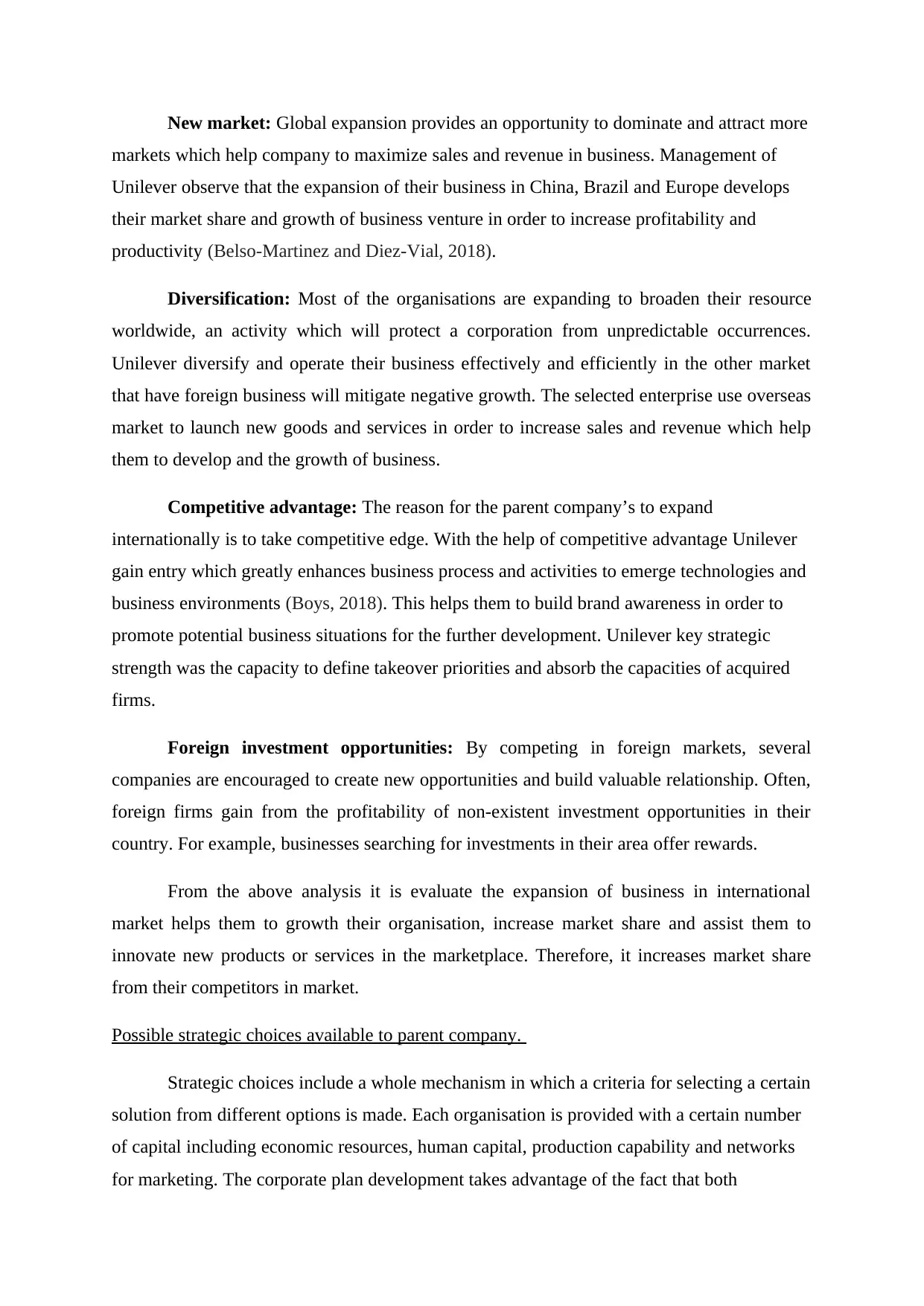
New market: Global expansion provides an opportunity to dominate and attract more
markets which help company to maximize sales and revenue in business. Management of
Unilever observe that the expansion of their business in China, Brazil and Europe develops
their market share and growth of business venture in order to increase profitability and
productivity (Belso-Martinez and Diez-Vial, 2018).
Diversification: Most of the organisations are expanding to broaden their resource
worldwide, an activity which will protect a corporation from unpredictable occurrences.
Unilever diversify and operate their business effectively and efficiently in the other market
that have foreign business will mitigate negative growth. The selected enterprise use overseas
market to launch new goods and services in order to increase sales and revenue which help
them to develop and the growth of business.
Competitive advantage: The reason for the parent company’s to expand
internationally is to take competitive edge. With the help of competitive advantage Unilever
gain entry which greatly enhances business process and activities to emerge technologies and
business environments (Boys, 2018). This helps them to build brand awareness in order to
promote potential business situations for the further development. Unilever key strategic
strength was the capacity to define takeover priorities and absorb the capacities of acquired
firms.
Foreign investment opportunities: By competing in foreign markets, several
companies are encouraged to create new opportunities and build valuable relationship. Often,
foreign firms gain from the profitability of non-existent investment opportunities in their
country. For example, businesses searching for investments in their area offer rewards.
From the above analysis it is evaluate the expansion of business in international
market helps them to growth their organisation, increase market share and assist them to
innovate new products or services in the marketplace. Therefore, it increases market share
from their competitors in market.
Possible strategic choices available to parent company.
Strategic choices include a whole mechanism in which a criteria for selecting a certain
solution from different options is made. Each organisation is provided with a certain number
of capital including economic resources, human capital, production capability and networks
for marketing. The corporate plan development takes advantage of the fact that both
markets which help company to maximize sales and revenue in business. Management of
Unilever observe that the expansion of their business in China, Brazil and Europe develops
their market share and growth of business venture in order to increase profitability and
productivity (Belso-Martinez and Diez-Vial, 2018).
Diversification: Most of the organisations are expanding to broaden their resource
worldwide, an activity which will protect a corporation from unpredictable occurrences.
Unilever diversify and operate their business effectively and efficiently in the other market
that have foreign business will mitigate negative growth. The selected enterprise use overseas
market to launch new goods and services in order to increase sales and revenue which help
them to develop and the growth of business.
Competitive advantage: The reason for the parent company’s to expand
internationally is to take competitive edge. With the help of competitive advantage Unilever
gain entry which greatly enhances business process and activities to emerge technologies and
business environments (Boys, 2018). This helps them to build brand awareness in order to
promote potential business situations for the further development. Unilever key strategic
strength was the capacity to define takeover priorities and absorb the capacities of acquired
firms.
Foreign investment opportunities: By competing in foreign markets, several
companies are encouraged to create new opportunities and build valuable relationship. Often,
foreign firms gain from the profitability of non-existent investment opportunities in their
country. For example, businesses searching for investments in their area offer rewards.
From the above analysis it is evaluate the expansion of business in international
market helps them to growth their organisation, increase market share and assist them to
innovate new products or services in the marketplace. Therefore, it increases market share
from their competitors in market.
Possible strategic choices available to parent company.
Strategic choices include a whole mechanism in which a criteria for selecting a certain
solution from different options is made. Each organisation is provided with a certain number
of capital including economic resources, human capital, production capability and networks
for marketing. The corporate plan development takes advantage of the fact that both
Paraphrase This Document
Need a fresh take? Get an instant paraphrase of this document with our AI Paraphraser
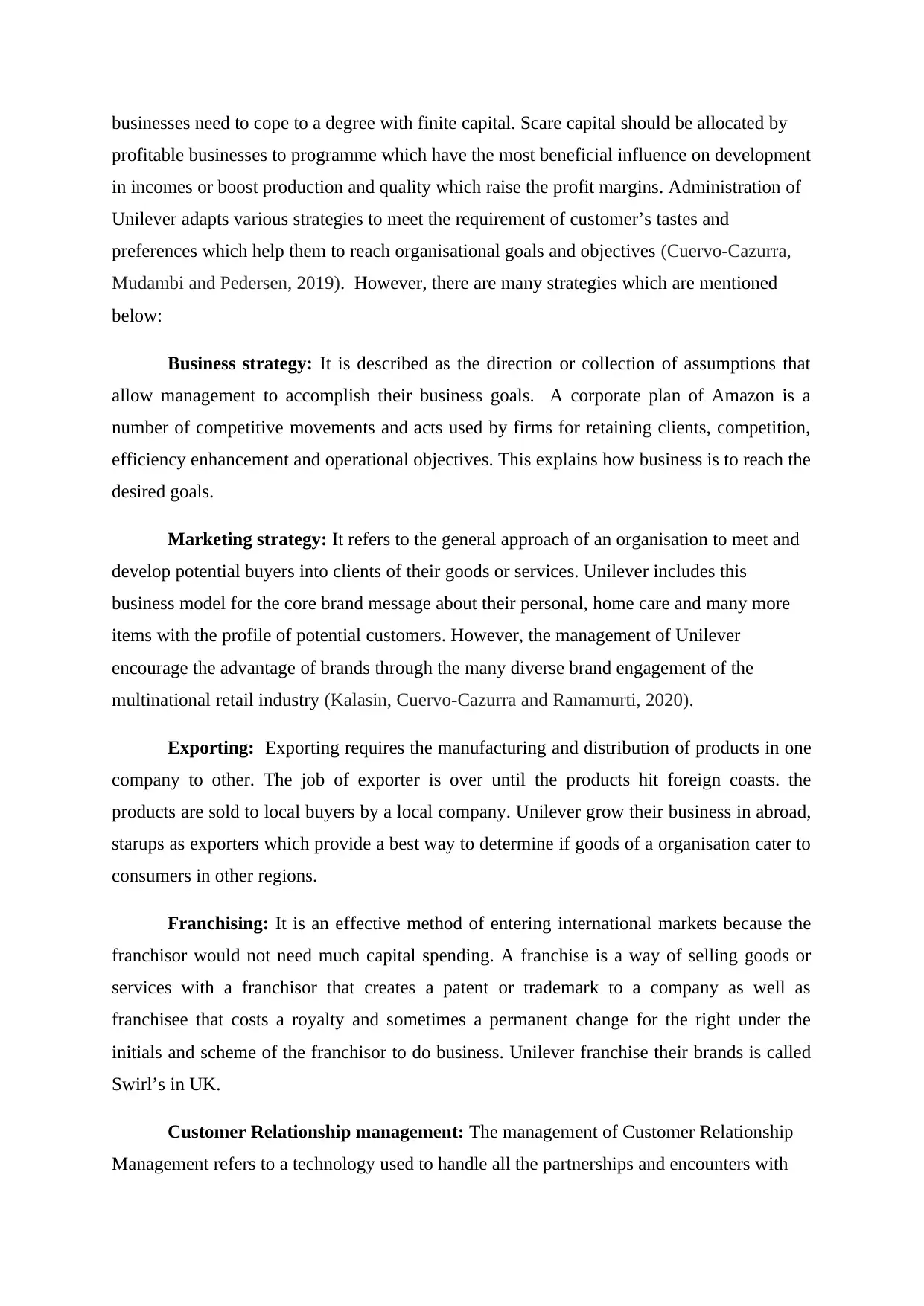
businesses need to cope to a degree with finite capital. Scare capital should be allocated by
profitable businesses to programme which have the most beneficial influence on development
in incomes or boost production and quality which raise the profit margins. Administration of
Unilever adapts various strategies to meet the requirement of customer’s tastes and
preferences which help them to reach organisational goals and objectives (Cuervo‐Cazurra,
Mudambi and Pedersen, 2019). However, there are many strategies which are mentioned
below:
Business strategy: It is described as the direction or collection of assumptions that
allow management to accomplish their business goals. A corporate plan of Amazon is a
number of competitive movements and acts used by firms for retaining clients, competition,
efficiency enhancement and operational objectives. This explains how business is to reach the
desired goals.
Marketing strategy: It refers to the general approach of an organisation to meet and
develop potential buyers into clients of their goods or services. Unilever includes this
business model for the core brand message about their personal, home care and many more
items with the profile of potential customers. However, the management of Unilever
encourage the advantage of brands through the many diverse brand engagement of the
multinational retail industry (Kalasin, Cuervo‐Cazurra and Ramamurti, 2020).
Exporting: Exporting requires the manufacturing and distribution of products in one
company to other. The job of exporter is over until the products hit foreign coasts. the
products are sold to local buyers by a local company. Unilever grow their business in abroad,
starups as exporters which provide a best way to determine if goods of a organisation cater to
consumers in other regions.
Franchising: It is an effective method of entering international markets because the
franchisor would not need much capital spending. A franchise is a way of selling goods or
services with a franchisor that creates a patent or trademark to a company as well as
franchisee that costs a royalty and sometimes a permanent change for the right under the
initials and scheme of the franchisor to do business. Unilever franchise their brands is called
Swirl’s in UK.
Customer Relationship management: The management of Customer Relationship
Management refers to a technology used to handle all the partnerships and encounters with
profitable businesses to programme which have the most beneficial influence on development
in incomes or boost production and quality which raise the profit margins. Administration of
Unilever adapts various strategies to meet the requirement of customer’s tastes and
preferences which help them to reach organisational goals and objectives (Cuervo‐Cazurra,
Mudambi and Pedersen, 2019). However, there are many strategies which are mentioned
below:
Business strategy: It is described as the direction or collection of assumptions that
allow management to accomplish their business goals. A corporate plan of Amazon is a
number of competitive movements and acts used by firms for retaining clients, competition,
efficiency enhancement and operational objectives. This explains how business is to reach the
desired goals.
Marketing strategy: It refers to the general approach of an organisation to meet and
develop potential buyers into clients of their goods or services. Unilever includes this
business model for the core brand message about their personal, home care and many more
items with the profile of potential customers. However, the management of Unilever
encourage the advantage of brands through the many diverse brand engagement of the
multinational retail industry (Kalasin, Cuervo‐Cazurra and Ramamurti, 2020).
Exporting: Exporting requires the manufacturing and distribution of products in one
company to other. The job of exporter is over until the products hit foreign coasts. the
products are sold to local buyers by a local company. Unilever grow their business in abroad,
starups as exporters which provide a best way to determine if goods of a organisation cater to
consumers in other regions.
Franchising: It is an effective method of entering international markets because the
franchisor would not need much capital spending. A franchise is a way of selling goods or
services with a franchisor that creates a patent or trademark to a company as well as
franchisee that costs a royalty and sometimes a permanent change for the right under the
initials and scheme of the franchisor to do business. Unilever franchise their brands is called
Swirl’s in UK.
Customer Relationship management: The management of Customer Relationship
Management refers to a technology used to handle all the partnerships and encounters with
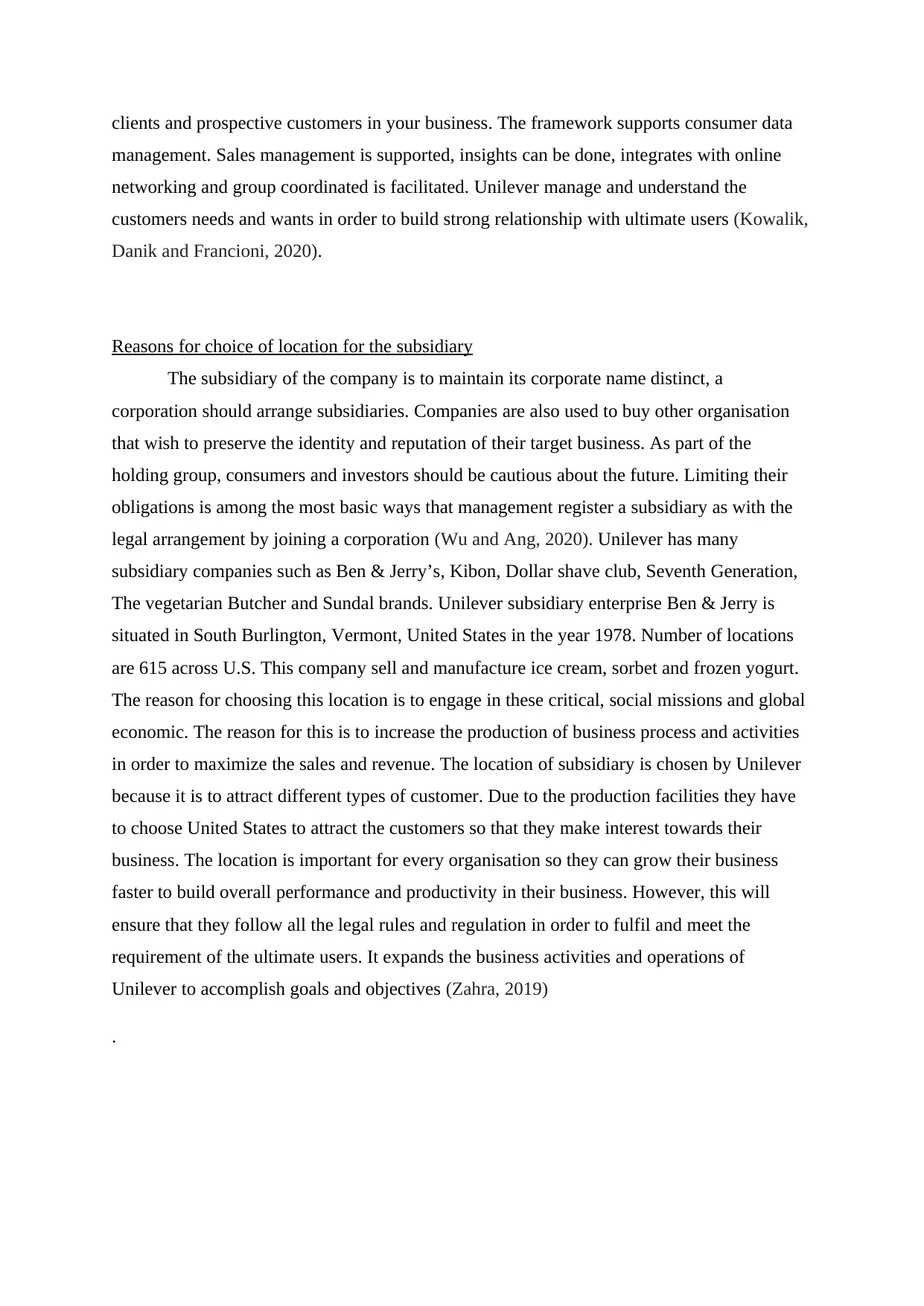
clients and prospective customers in your business. The framework supports consumer data
management. Sales management is supported, insights can be done, integrates with online
networking and group coordinated is facilitated. Unilever manage and understand the
customers needs and wants in order to build strong relationship with ultimate users (Kowalik,
Danik and Francioni, 2020).
Reasons for choice of location for the subsidiary
The subsidiary of the company is to maintain its corporate name distinct, a
corporation should arrange subsidiaries. Companies are also used to buy other organisation
that wish to preserve the identity and reputation of their target business. As part of the
holding group, consumers and investors should be cautious about the future. Limiting their
obligations is among the most basic ways that management register a subsidiary as with the
legal arrangement by joining a corporation (Wu and Ang, 2020). Unilever has many
subsidiary companies such as Ben & Jerry’s, Kibon, Dollar shave club, Seventh Generation,
The vegetarian Butcher and Sundal brands. Unilever subsidiary enterprise Ben & Jerry is
situated in South Burlington, Vermont, United States in the year 1978. Number of locations
are 615 across U.S. This company sell and manufacture ice cream, sorbet and frozen yogurt.
The reason for choosing this location is to engage in these critical, social missions and global
economic. The reason for this is to increase the production of business process and activities
in order to maximize the sales and revenue. The location of subsidiary is chosen by Unilever
because it is to attract different types of customer. Due to the production facilities they have
to choose United States to attract the customers so that they make interest towards their
business. The location is important for every organisation so they can grow their business
faster to build overall performance and productivity in their business. However, this will
ensure that they follow all the legal rules and regulation in order to fulfil and meet the
requirement of the ultimate users. It expands the business activities and operations of
Unilever to accomplish goals and objectives (Zahra, 2019)
.
management. Sales management is supported, insights can be done, integrates with online
networking and group coordinated is facilitated. Unilever manage and understand the
customers needs and wants in order to build strong relationship with ultimate users (Kowalik,
Danik and Francioni, 2020).
Reasons for choice of location for the subsidiary
The subsidiary of the company is to maintain its corporate name distinct, a
corporation should arrange subsidiaries. Companies are also used to buy other organisation
that wish to preserve the identity and reputation of their target business. As part of the
holding group, consumers and investors should be cautious about the future. Limiting their
obligations is among the most basic ways that management register a subsidiary as with the
legal arrangement by joining a corporation (Wu and Ang, 2020). Unilever has many
subsidiary companies such as Ben & Jerry’s, Kibon, Dollar shave club, Seventh Generation,
The vegetarian Butcher and Sundal brands. Unilever subsidiary enterprise Ben & Jerry is
situated in South Burlington, Vermont, United States in the year 1978. Number of locations
are 615 across U.S. This company sell and manufacture ice cream, sorbet and frozen yogurt.
The reason for choosing this location is to engage in these critical, social missions and global
economic. The reason for this is to increase the production of business process and activities
in order to maximize the sales and revenue. The location of subsidiary is chosen by Unilever
because it is to attract different types of customer. Due to the production facilities they have
to choose United States to attract the customers so that they make interest towards their
business. The location is important for every organisation so they can grow their business
faster to build overall performance and productivity in their business. However, this will
ensure that they follow all the legal rules and regulation in order to fulfil and meet the
requirement of the ultimate users. It expands the business activities and operations of
Unilever to accomplish goals and objectives (Zahra, 2019)
.
⊘ This is a preview!⊘
Do you want full access?
Subscribe today to unlock all pages.

Trusted by 1+ million students worldwide
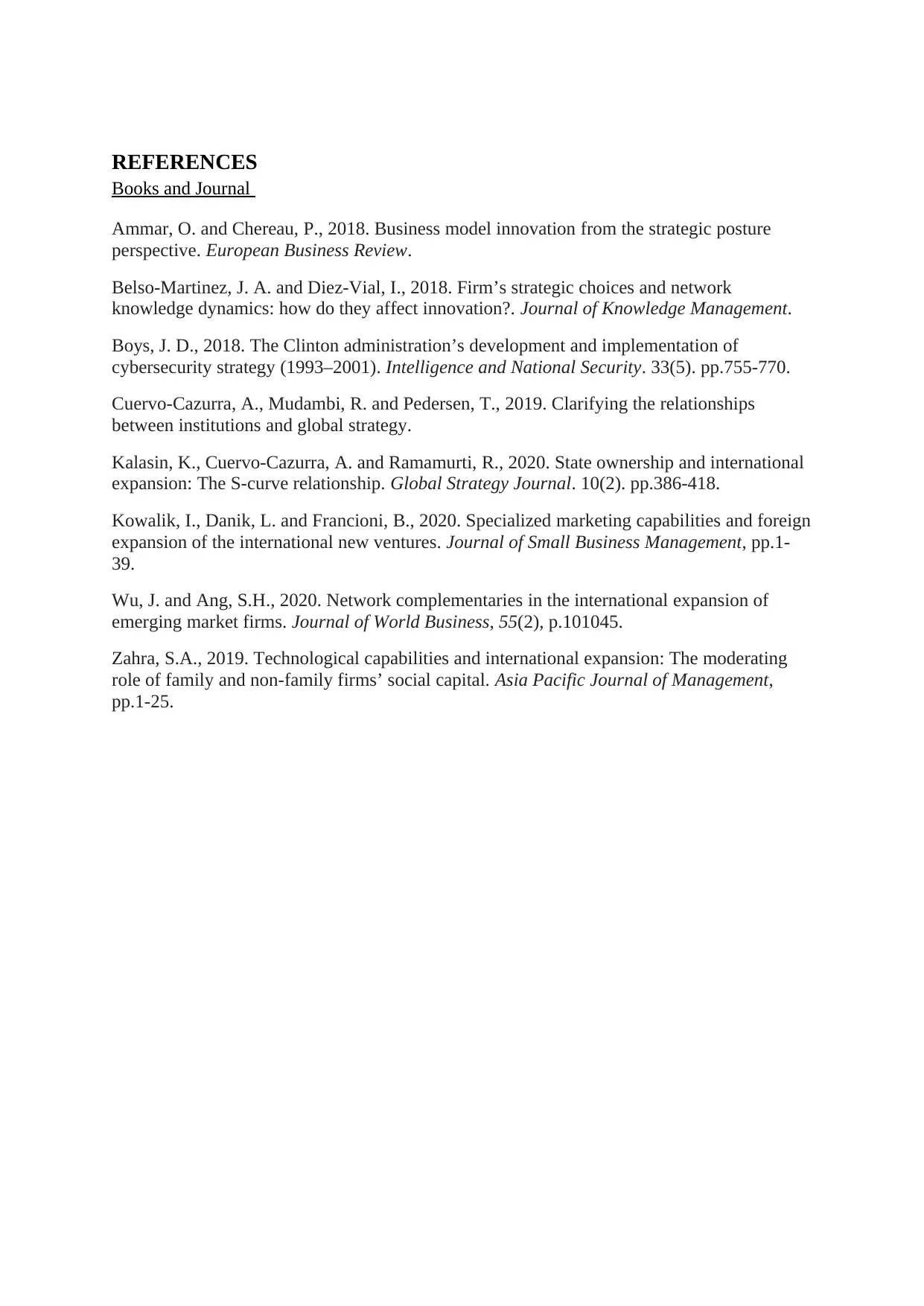
REFERENCES
Books and Journal
Ammar, O. and Chereau, P., 2018. Business model innovation from the strategic posture
perspective. European Business Review.
Belso-Martinez, J. A. and Diez-Vial, I., 2018. Firm’s strategic choices and network
knowledge dynamics: how do they affect innovation?. Journal of Knowledge Management.
Boys, J. D., 2018. The Clinton administration’s development and implementation of
cybersecurity strategy (1993–2001). Intelligence and National Security. 33(5). pp.755-770.
Cuervo‐Cazurra, A., Mudambi, R. and Pedersen, T., 2019. Clarifying the relationships
between institutions and global strategy.
Kalasin, K., Cuervo‐Cazurra, A. and Ramamurti, R., 2020. State ownership and international
expansion: The S‐curve relationship. Global Strategy Journal. 10(2). pp.386-418.
Kowalik, I., Danik, L. and Francioni, B., 2020. Specialized marketing capabilities and foreign
expansion of the international new ventures. Journal of Small Business Management, pp.1-
39.
Wu, J. and Ang, S.H., 2020. Network complementaries in the international expansion of
emerging market firms. Journal of World Business, 55(2), p.101045.
Zahra, S.A., 2019. Technological capabilities and international expansion: The moderating
role of family and non-family firms’ social capital. Asia Pacific Journal of Management,
pp.1-25.
Books and Journal
Ammar, O. and Chereau, P., 2018. Business model innovation from the strategic posture
perspective. European Business Review.
Belso-Martinez, J. A. and Diez-Vial, I., 2018. Firm’s strategic choices and network
knowledge dynamics: how do they affect innovation?. Journal of Knowledge Management.
Boys, J. D., 2018. The Clinton administration’s development and implementation of
cybersecurity strategy (1993–2001). Intelligence and National Security. 33(5). pp.755-770.
Cuervo‐Cazurra, A., Mudambi, R. and Pedersen, T., 2019. Clarifying the relationships
between institutions and global strategy.
Kalasin, K., Cuervo‐Cazurra, A. and Ramamurti, R., 2020. State ownership and international
expansion: The S‐curve relationship. Global Strategy Journal. 10(2). pp.386-418.
Kowalik, I., Danik, L. and Francioni, B., 2020. Specialized marketing capabilities and foreign
expansion of the international new ventures. Journal of Small Business Management, pp.1-
39.
Wu, J. and Ang, S.H., 2020. Network complementaries in the international expansion of
emerging market firms. Journal of World Business, 55(2), p.101045.
Zahra, S.A., 2019. Technological capabilities and international expansion: The moderating
role of family and non-family firms’ social capital. Asia Pacific Journal of Management,
pp.1-25.
Paraphrase This Document
Need a fresh take? Get an instant paraphrase of this document with our AI Paraphraser

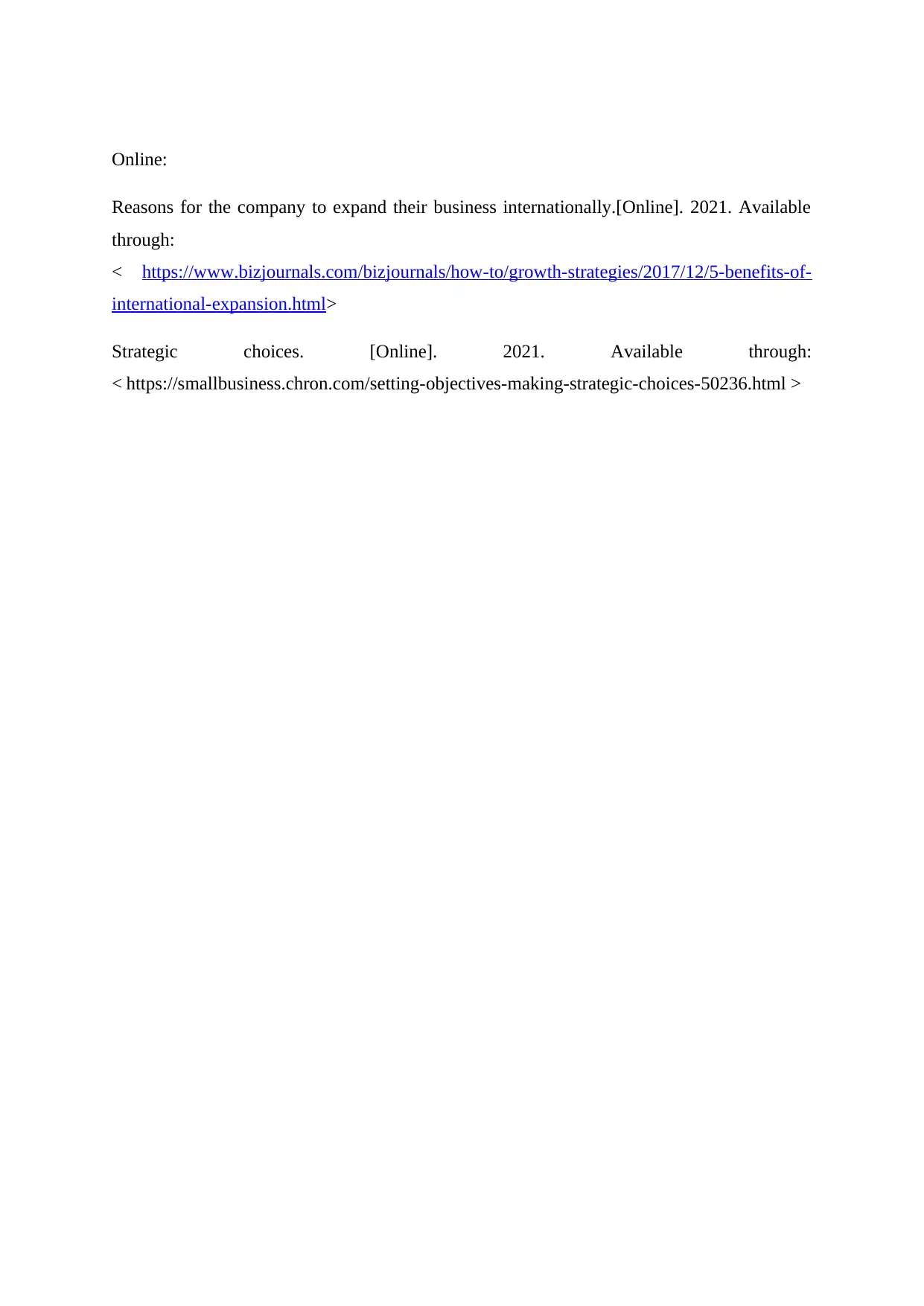
Online:
Reasons for the company to expand their business internationally.[Online]. 2021. Available
through:
< https://www.bizjournals.com/bizjournals/how-to/growth-strategies/2017/12/5-benefits-of-
international-expansion.html>
Strategic choices. [Online]. 2021. Available through:
< https://smallbusiness.chron.com/setting-objectives-making-strategic-choices-50236.html >
Reasons for the company to expand their business internationally.[Online]. 2021. Available
through:
< https://www.bizjournals.com/bizjournals/how-to/growth-strategies/2017/12/5-benefits-of-
international-expansion.html>
Strategic choices. [Online]. 2021. Available through:
< https://smallbusiness.chron.com/setting-objectives-making-strategic-choices-50236.html >
⊘ This is a preview!⊘
Do you want full access?
Subscribe today to unlock all pages.

Trusted by 1+ million students worldwide
1 out of 9
Related Documents
Your All-in-One AI-Powered Toolkit for Academic Success.
+13062052269
info@desklib.com
Available 24*7 on WhatsApp / Email
![[object Object]](/_next/static/media/star-bottom.7253800d.svg)
Unlock your academic potential
Copyright © 2020–2026 A2Z Services. All Rights Reserved. Developed and managed by ZUCOL.




